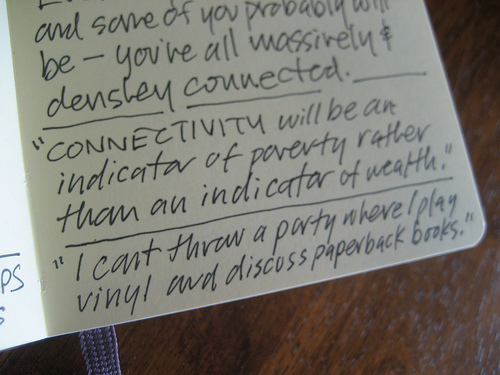Connectivity as Poverty
Editor's Note
This was originally posted to Jim Groom's blog [https://edtechbooks.org/-fHy] on April 5, 2009.

I have to say that it’s a crime that the audio of Bruce Sterling’s rant at this year’s SXSW Interactive hasn’t been posted online yet. it was one of the few highlights to an otherwise lackluster conference. SXSW was one of the most anti-intellectual conferences I have ever been to—any mentions of theory, or big scary words like “postmodernism,” were immediately scorned upon or shot down. Heather Gold’s moderation of the “Everything I Needed to Know about the Web I Learned from Feminism” [https://edtechbooks.org/-tem] was an excellent example of pitching to the least common denominator while shamelessly promoting herself. God forbid she let danah boyd say a big word!
And I have to say it was absurd how everyone and their mother was fawning over Twitter as if it came out yesterday (it’s almost three years old and preparing to join the Google family already, people). Seemed to me like people were walking around mindlessly celebrating a rather uninspired landscape of technology and thought at the conference more generally (and the EDUPUNK panel I was part of must certainly be included in this characterization of uninspired). I’d heard a lot of good things about this conference, but I guess I missed the boat on this one cause this year’s event was more of the same bullshit online branding and marketing speak–just a bit more impressively masked as either mindless tech market Utopianism or self-help 2.0.
Yet, to be fair it wasn’t all bad, there was at least one highlight for me. Bruce Sterling’s rant was right on. I was hoping to listen to it again before I talked about it in more detail. In fact, I’ll have to do that cause I can only recall bits and pieces, but there was a point in his stream of thought that really impressed me (well, besides his discussion of the future of publishing as epitomized by survivalist bookstores like Brave New Books [https://edtechbooks.org/-MGT]—which I loved). He went off about how much we had miscalculated the digital divide theories of the 90s that were to define the digital world of haves and have-nots by whether they were or weren’t connected. It seemed logical to assume that the impoverished would not be connected, whereas the rich would be decadently consuming all the bandwidth.
Well, as he pointed out, it didn’t quite work out that way, connectivity became cheap with cellphones, and he comically noted that “poor folk love their cellphones!” What’s happening is that this increased dependence upon connectivity, rather than being some kind of indicator of privilege, is actually a sign of our increased impoverishment. The fact is that the wealthy are those who can afford not to be connected, not to be pimping their “online brand” so shamelessly, not twittering their asses off at all hours of the day for a quick networking fix. The impoverishment of networks through connectivity!—it was such a radical re-thinking of this idea of connectivity as the new “social capital” (when did Pierre Bourdieu [https://edtechbooks.org/-ndU] enter the Web 2.0 vocabulary?–do these dickheads know a ‘postmodern’ social theorist infused that term with its contemporary meaning?). Connectivity as poverty, trippy, that might throw a wrench into the Connectivism theory though :) It kinda makes sense to my poor ass cause that’s how I’m living—and this is all just a cheap thrill to avoid thinking about the inevitable.
This content is provided to you freely by EdTech Books.
Access it online or download it at https://edtechbooks.org/wild/connectivity_as_poverty.


